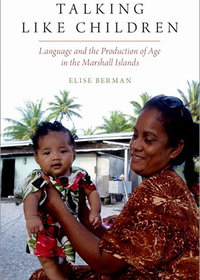
- University of North Carolina at Charlotte
- Assistant Professor
- Residential Fellow (2012-2013)
- “Learning How to Know: The Social Control of Goods and Information in the Marshall Islands”
Elise Berman is Assistant Professor of Anthropology at the University of North Carolina at Charlotte and she specializes in linguistic, cultural, and psychological anthropology.
Professor Berman’s research focuses on the politics of language and exchange, the social construction of age and childhood, the role of deception in social life, and variation in understandings of truth and knowledge across cultures and contexts. Her early research, focused on Guatemala and Great Britain, has been published in Childhood and Journal for the Scientific Study of Religion. In her dissertation, The Faces of Deception: Childhood, Age, and Avoiding Giving in the Marshall Islands, which is based on fourteen months of fieldwork in the Republic of the Marshall Islands, Professor Berman argues that exchange in the Marshall Islands cannot be understood without analyzing how people avoid giving. In turn, the avoidance of giving cannot be understood without analyzing children’s unique communicative powers to say things to adults that they might not say to each other. Her research challenges standard understandings of socialization and cultural reproduction, demonstrating that, paradoxically, children learn mature modes of giving and speaking by engaging in activity that is inappropriate for adults.
Her work has been supported by the National Science Foundation, the Wenner-Gren Foundation, the Society for Psychological Anthropology, and the University of Chicago. Most recently she held a Provost Dissertation-Year Fellowship, a University of Chicago award given to the top candidate for a Markovitz fellowship. The Markovitz fellowship is awarded to dissertators whose work analyzes connections between social and economic behavior.
Publications
-
Talking Like Children: Language and the Production of Age in the Marshall Islands
Oxford University Press, 2019

Children in the Marshall Islands do many things that adults do not. They walk around half naked. They carry and eat food in public without offering it to others. They talk about things they see rather than hiding uncomfortable truths. They explicitly refuse to give. Why do they do these things?
Many think these behaviors are a natural result of children’s innate immaturity. But Elise Berman argues that children are actually taught to do things that adults avoid: to be rude, inappropriate, and immature. Before children learn to be adults, they learn to be different from them. Berman’s main theoretical claim therefore is also a novel one: age emerges through interaction and is a social production.
In Talking Like Children, Berman analyzes a variety of interactions in the Marshall Islands, all broadly based around exchange: adoption negotiations, efforts to ask for or avoid giving away food, contentious debates about supposed child abuse. In these dramas both large and small, age differences emerge through the decisions people make, the emotions they feel, and the power they gain. Berman’s research includes a range of methods – participant observation, video and audio recordings, interviews, children’s drawings – that yield a significant corpus of data including over 80 hours of recorded naturalistic social interaction.
Presented as a series of captivating stories, Talking Like Children is an intimate analysis of speech and interaction that shows what age means. Like gender and race, age differences are both culturally produced and socially important. The differences between Marshallese children and adults give both groups the ability to manipulate social life in distinct but often complementary ways. These differences produce culture itself. Talking Like Children establishes age as a foundational social variable and a central concern of anthropological and linguistic research.